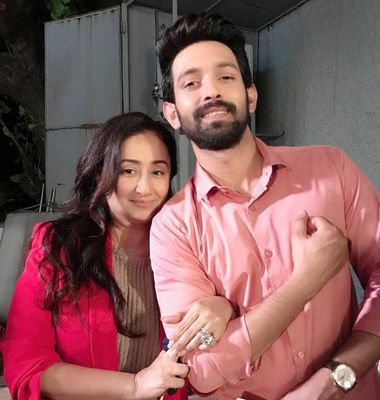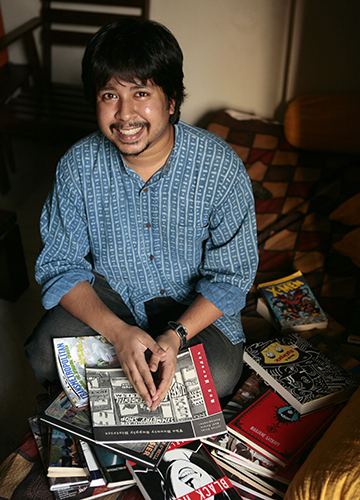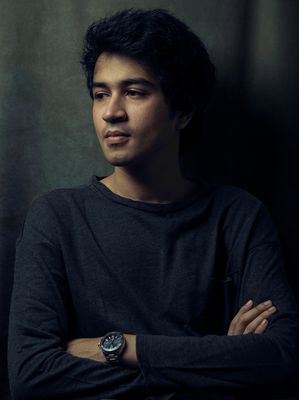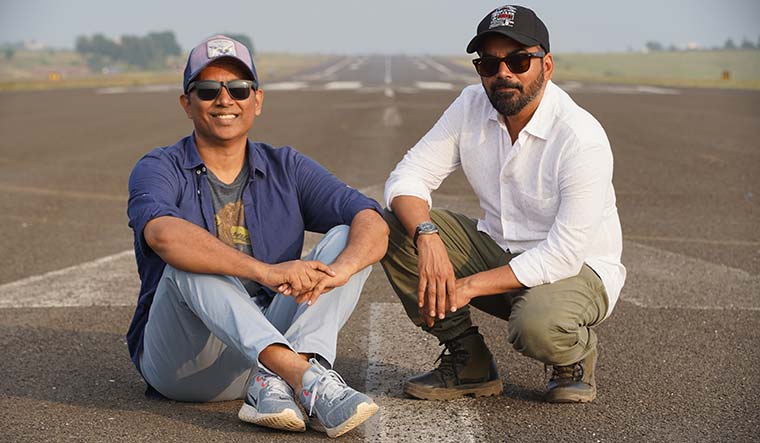About a year ago, Abhishek Yadav, a fresh IIT Bombay graduate, took a leap of faith when he put his career in metallurgical technology on hold to try his luck as a scriptwriter in I’mMature—a five-episode coming-of-age web series on MX Player. His gripping narrative on the headiness of adolescent love, friendship and rebellion hit the bull’s eye; the show was nominated for the first edition of the Cannes International Series Festival, Canneseries. For Yadav, with no prior background or training in scriptwriting, the break was nothing short of a “miracle”. The 27-year-old had finally found his calling.
Around the same time, Arun Guhan left his plum job with an IT company in Bengaluru and moved to Chennai as a line producer for Wallwatcher films, started jointly by Tamil film directors Gayathri and Pushkar of the Vikram Vedha fame. Guhan scouts for shoot locations and ensures that everything, from costumes to art to props to the animal required on set, is in place and as per the script. He gets half the money he would have earned in his steady job of four years, but the 28-year-old mechanical engineer does not mind. For him, the opportunity to work on a web series that will soon be an Amazon Prime Original is too good to let go of. “I could never have imagined doing this in the south film industry that breeds on nepotism and does not favour the young and inexperienced,” says Guhan. “With so much digital content in demand, there is a lot to do and I am sure my future is lucrative.”
With the penetration of mobile phones, unlimited and cheap data that comes at the price of a coffee and access to different content across niche genres, the video-on-demand market, which allows viewers to watch what they want and when they want it, has begun to explode. Quoting a study by Ericsson, a 2018 report by MICA mentions that 70 per cent of the consumers now watch regular TV content and videos on a smartphone and that by 2020, hardly 10 per cent will remain loyal to their TV set. This, in turn, has led to a humongous demand for digital content on over-the-top platforms (OTTs) or streaming services, especially homegrown, local content in the form of an episodic series meant exclusively for the internet that can get viewers to subscribe and stay put without moving on to another platform in seconds. “Driving this enormous greed for good quality content is an influx of aggressive first-timers and newbies from different walks of life and across skill sets, right from scriptwriters and actors to art directors, cinematographers and production designers, who are latching on to the bandwagon for the tremendous opportunities it offers,” says Niranjan Kaushik, an advertising professional-turned-filmmaker. “At the same time, there are also known faces from within Bollywood who otherwise did not get their time in the sun but now are driven to shine.” Kaushik switched careers in 2017 when he was contacted by producers Akash Chawla and Joy Sen Gupta of Fresh Lime Films to write Karenjit Kaur, based on actor Sunny Leone’s life, for Zee5. One season, ten episodes and a very successful show later, he thinks that he always belonged to the world of long-form content.
But when Balaji Jayaraman, a full-time tech consultant with no filmi background, penned a comedy in which a major part of the humour came from embarrassing and mistaken identity situations inspired from his own life, little did he know that he would one day get to co-direct the untitled Tamil series, too. “After spending 15 days to write the entire first draft, I approached [ace Tamilian director Karthik Subbaraj’s production company] with the story synopsis and the next thing I knew Hotstar was funding it. I am expecting a fat paycheck that would equal three months of my salary,” says Jayaraman.
Up until two years ago, only online players like The Viral Fever, All India Bakchod and Pocket Aces were putting out content, essentially on YouTube, that could qualify as web series. But with players like Netflix, Hotstar and Amazon Prime Video entering the market with popular series like Sacred Games, Game of Thrones and Made In Heaven, the scenario has changed drastically. The money involved in the making of a web series is huge, all thanks to corporates from international platforms betting big on original Indian content. Take, for instance, Sacred Games, which had a crew of more than 3,500 people. Netflix invested more than Rs100 crore in the second season of the crime thriller series. Its second season had Anurag Kashyap, Neeraj Ghaywan and Vikramaditya Motwane, all in different roles, handling the show. Reports state that the show, which was the first-of-its-kind Indian original on an international platform, will soon be outplayed in budget and scale by Nikkhil Advani’s Moghuls—based on Alex Rutherford’s novel series Empire of the Moghul—on Hotstar. Where a small film can be made for Rs2 crore to Rs5 crore, a web show can cost between Rs20 lakh and Rs5 crore per episode. With so much money at stake, the amount of employment it has generated is huge—every series has a crew of around 200 people.
“Harsh as it may sound, we need to accept the fact that there is no growth in films,” says Sarita Tanwar, a veteran journalist-turned-producer. She cites the example of first assistant directors who would have had to wait for 10 to 15 years to direct a film but are now directing web shows. Tanwar turned producer for the second season of Ekta Kapoor’s romantic web series Broken But Beautiful, starring Vikrant Massey, which airs on Kapoor’s streaming platform AltBalaji.
Essentially, a web series, commissioned by or licensed to a bigger OTT platform, requires a minimum of eight episodes with a running time of 45 minutes to an hour per episode or five to six episodes of 25 minutes each. So, where a film requires a script that will last for two to three hours, an OTT requires content that stretches up to eight hours or more per show per season. This has generated an enormous demand for plot-heavy, long-form narratives that are gripping and new-age.
Earlier, there was a lot of corporate hierarchy that one had to go through to get one’s content out there, but thanks to YouTube one could take content directly to people without having a middleman. That made corporates open up to content creators who could bring in fresh viewpoints.
“In the case of web series or films made exclusively for the digital audience, the battle for eyeballs is pretty much won and lost in the writer’s room,” says novelist Samit Basu, who scripted and co-directed House Arrest, his first digital film. “It is the story that moves the platform and not the other way round. People from any and every industry or walk of life can come in if they have a good story to tell and sell.” A Netflix original, the film, starring Ali Fazal, is a fun take on a man who has not stepped out of his house for six months and does not wish to. Many films, written over the years, were lying in cold storage, says Basu, and would never have made it to the big screen as they were not commercially viable. “These wonderful stories are now being changed into web series,” he says. “So, the content which was too good for films and too ahead of its time for television is now perfect for digital.” House Arrest, too, was first written for Bollywood seven years ago. “Had it not been for this kind of web series format, House Arrest would never have been made,” he admits.
Basu’s voice finds an echo in Bilal Siddiqui, a 20-year-old college student whose bestseller—Bard of Blood—combining the worlds of espionage and subcontinental politics was adapted into a Netflix series. Produced by Shah Rukh Khan’s Red Chillies Entertainment, it has Emraan Hashmi in the leading role. “Had it not been for this this crazy demand for digital content, I would never have gotten noticed,” he says. “I think streaming allows a certain flexibility and time period in which people are more willing to try new things and new artists.”
On a balmy weekend afternoon in November, a visit to the sets of Chargesheet: The Shuttlecock Murder—an upcoming eight-episode web series—inside Mumbai’s Sanjay Gandhi National Park proves insightful in many ways. Half of the 100-odd people who make for the entire cast and crew are newbies. And, they include writer and show-runner Priyanka Ghatak, who penned her first web series even before she could finish her novel based on the same plot, and Nupur Vashisht, 25, who came to Mumbai from Delhi two years ago and is now the “director’s girl Friday” who supervises everything from coordination and casting to costumes. “The best part about working on a web series is that it allows one to diversify,” says Vashisht. “Earlier, in the television shows I worked on I was restricted in my role as an assistant. But now I can explore my potential to the best of my ability.”
It is a sentiment shared by actors, too. Many who spent their entire career doing bit-sized but interesting roles are now leading the cast. Take, Shefali Shah, for instance, who played the lead in Delhi Crime. The 46-year-old played her part with such earnestness that she says a lot of people mistook her for an actual cop. It was a role where she rediscovered herself and grew as an actor, she says. “I could not have imagined getting this kind of role in Bollywood and especially not at my age,” confesses Shah, who is in her forties.
When Arunoday Singh bagged the role of the lead protagonist in season one of Apharan, an action thriller directed by Siddharth Sen Gupta for ALTBalaji, it was as if he had got a new lease of life. “I had turned self-deprecating and insecure and was close to quitting,” he says. “The thing is I never got launched in Bollywood and there were only so many side roles I was willing to do.” In web series though, it is the story and the character that matters and not who is doing it. Also, the fact that a web series or a digital film drops across 190 countries at one go helps platforms to emphasise on content and character rather than on individuals who are treated as brands.
“We are willing to go beyond marquee names,” says Aparna Acharekar, programming head at ZEE5 India. Professionalism and streamlining of payment structures are also significant factors that have led to a number of artists across skill-sets drifting towards the industry. Basu remembers a crew that was happy to be working on a digital film, despite it being shot in the scorching summers of Delhi, just because the film was funded by a big platform. “They were sure to be paid on time, which apparently does not happen very often,” says Basu, smirking.
The digital world allows tremendous creative freedom to filmmakers, too, what with no censor board breathing down their necks. And, it was for the relatively “chilled out and liberal” work milieu offered by production houses down south that cinematographer Sajeesh Rajendran moved from the advertising industry after 10 years to work on his first web series produced by the house of Telugu star Allu Arjun.
For Jahan Singh Bakshi, who subtitles digital content in Hindi to English, what matters is the immense visibility and reach offered by the medium along with improving the quality of subtitles across genres. He has worked on web series like Sacred Games, Leila, Jaoon Kahan Bata Ae Dil and films like Badhaai Ho and Stree. “The volume of work in subtitling has increased substantially with OTT platforms,” he says. “Earlier, we would only subtitle for a film that was to release overseas or if it was going to a festival. But now, almost every film and web series that finds its way to the OTT platform must be mandatorily subtitled because it has the possibility of attracting viewership from across the world.” Also, the quality of subtitles has improved with the entry of OTTs, he says. “In Bollywood, where the quality of subtitles was dismal earlier, and a song ‘Sharara Sharara... Main hoon ek sharara’ from Mere Yaar Ki Shaadi Hai was loosely subtitled as ‘Spark, Spark... I’m Spark’, the entry of corporates is a relief as now everything is monitored and poor quality work is immediately dismissed,” he says.
Filmmaker duo Raj Nidimoru and Krishna D.K. knew from the beginning that The Family Man (Amazon Prime) was more of a series idea than a film one “because in a series you follow a character or a theme and the canvas is much wider”. Also, they do not agree with people who say that an original film idea was later made into a series. “Writing itself is a humongous task, especially because one has to have all the elements of a potboiler that lasts not for 90 minutes, but for 450-500 minutes,” they say. “It is like writing a novel or playing a five-day test match compared with a one-day match.” The duo wrote all the ten episodes at one stretch and shot it like a film. “If we had much more luxury of budget, then we would have shot episode [by episode],” they say. “But we did not want to shoot for weeks because then we would have shot five times the length of a film in terms of shooting days.” For a film, they would have shot for 250 days, but the series was shot in a record 77 days.
Amrita Goswami, commissioning editor, fiction, MX Player, says that with more and more web series being made and platforms being launched, “things have become much more transparent, professional and streamlined”. “Everything is on paper, with the timelines and deliverables and payments assured,” she says. “We get over 50 story pitches every single week, which I think must be more than the volume of story ideas pitched to a Bollywood studio.”
But with the rise of OTT platforms, experts say that theatrical films will start going the global way, wherein films will be big-scale, artsy and be more and more about the experience such as Baahubali. Having said that, “gradually, even a Shah Rukh Khan will be seen dabbling in a web series,” says Basu. “That is where all the new-age employment seems to be heading and that is where good money will come from.”






